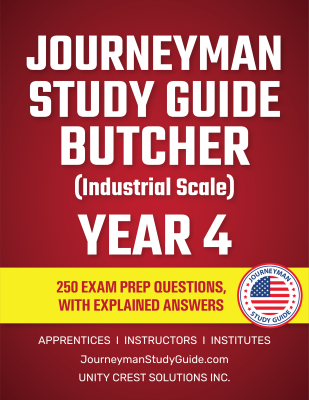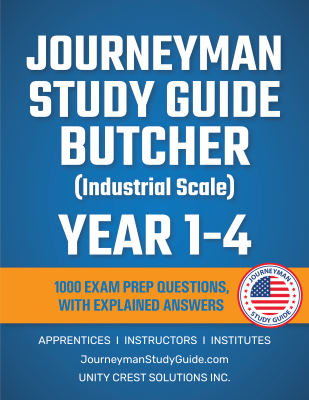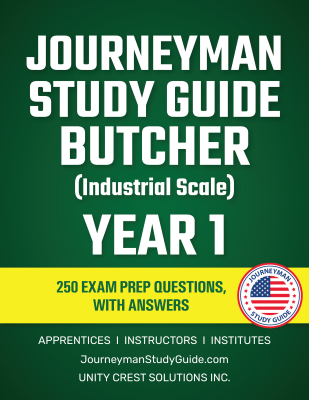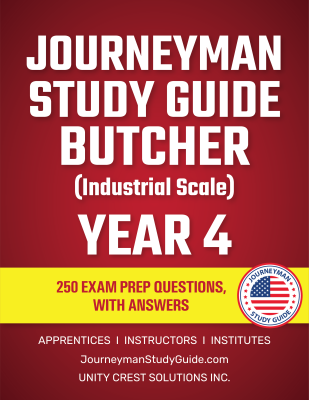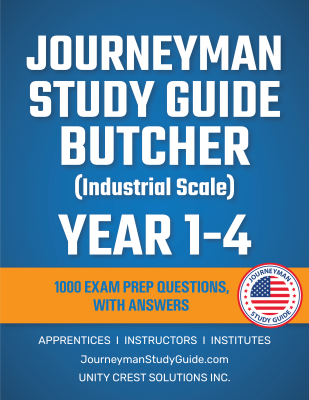Questions, Answers, & Explanations
Get clear explanations behind every answer, perfect for deeper learning and more thorough exam preparation.
Site Updates in Progress: Things might look different as we work on enhancing your experience.
What is an Industrial-Scale Butcher?
An industrial-scale butcher is a skilled professional responsible for processing large quantities of meat in commercial facilities such as slaughterhouses, meatpacking plants, and food processing companies. These butchers handle the breakdown, cutting, and packaging of meat products for distribution to grocery stores, restaurants, and food service providers across the U.S. Major employers include Tyson Foods, Smithfield Foods, and Cargill Meat Solutions.
Key Responsibilities:
Industrial-scale butchers perform specialized tasks that require technical skill and adherence to strict safety and sanitation regulations:
Skills and Traits for Success:
Successful industrial-scale butchers must have a combination of technical skills and physical endurance:
Industries Where Industrial-Scale Butchers Thrive:
Industrial butchers play a critical role in multiple food industries:
Why Choose This Career?
A career as an industrial-scale butcher provides stability, competitive wages, and opportunities for advancement:
Ready to Start Your Career as an Industrial-Scale Butcher?
Prepare for success with our comprehensive study resources, detailed Q&A, insightful Q/A Explanation, and interactive Online Tests, specifically designed for aspiring butchers.
What to Expect on the Industrial Butcher Certification Exam
The Industrial Butcher Certification Exam ensures that meat processing professionals meet safety, sanitation, and equipment operation standards. Many large employers, including Tyson Foods, Smithfield Foods, and Cargill, require certification as proof of competency and adherence to USDA and OSHA guidelines.
Exam Format:
Key Topics Covered:
Passing Requirements:
Most certifying bodies require a passing score of 70% or higher. Some programs include hands-on skills testing in addition to the written exam.
Tips for Effective Preparation:
Ready to Pass Your Certification Exam?
Ensure your success with our expertly designed study resources for industrial butchers.
What Types of Questions Are on the Industrial Butcher Certification Exam?
The certification exam assesses knowledge of meat processing techniques, safety protocols, and regulatory compliance. Employers like JBS USA and Perdue Farms prefer certified professionals who demonstrate expertise in safe and efficient meat handling.
Common Question Formats:
Sample Questions:
Ready to Ace Your Exam?
Prepare with our Q&A, Q/A Explanation, and Online Tests tailored for industrial-scale butchers.
What Is It Like to Work as an Industrial Butcher?
A day in the life of an industrial butcher is fast-paced, physically demanding, and essential to the food supply chain. Whether working for Tyson Foods, JBS USA, or Smithfield Foods, butchers play a crucial role in ensuring efficient meat processing and safe food production.
Morning: Preparing for the Shift
Midday: Meat Processing and Quality Control
Afternoon: Packaging and Clean-Up
Challenges and Rewards
Ready to Start Your Career?
Enhance your skills with our Q&A, Q/A Explanation, and Online Tests designed for Industrial Butchers.
What Are the Long-Term Benefits of a Career as an Industrial Butcher?
A career in industrial meat processing offers strong job security, competitive wages, and pathways to specialized roles in food production, quality assurance, and plant management.
Earning Potential in Meat Processing
Career Growth Opportunities
Why Choose a Career in Industrial Meat Processing?
Ready to Advance Your Career?
Prepare for long-term success with our Q&A, Q/A Explanation, and Online Tests for Industrial Butchers.
How Much Can You Earn as an Industrial Butcher?
Industrial butchers in the United States earn competitive wages, with pay varying by experience, location, and employer. Companies such as Tyson Foods, JBS USA, and Smithfield Foods offer structured pay scales, benefits, and career advancement opportunities.
General Wage Ranges:
Factors That Impact Wages:
Boost Your Earning Potential
Enhance your career with our Q&A, Q/A Explanation, and Online Tests, designed to help industrial butchers refine their skills and advance in the industry.
What Tools and Resources Do Industrial Butchers Need to Succeed?
Industrial butchers rely on specialized tools and learning resources to improve efficiency, ensure safety, and maintain high product quality. Proper equipment and industry knowledge are essential for success in meat processing plants and food distribution centers.
Essential Tools for Industrial Butchers:
Recommended Learning Resources:
Why the Right Tools Matter
Using high-quality tools and educational resources increases efficiency, ensures safety, and enhances career opportunities in the meat processing industry.
Ready to Equip Yourself for Success?
Get ahead in your butchering career with our Q&A, Q/A Explanation, and Online Tests designed for Industrial Butchers.
Where Can You Learn Industrial Butchery Skills?
Industrial butchers can gain specialized training through vocational schools, apprenticeship programs, and industry certifications. Programs offered by institutions such as Iowa Western Community College, Texas State Technical College, and University of Wisconsin – Meat Science and Animal Biologics Discovery provide hands-on training in meat processing, safety regulations, and equipment operation.
Types of Butcher Education Programs:
What to Expect in Training Programs:
Choosing the Right Program:
Why Education Matters in Industrial Butchery
Proper training ensures compliance with safety regulations, increases job prospects, and prepares butchers for career advancement in the industry.
Ready to Start Your Butchering Education?
Begin your training with our Q&A, Q/A Explanation, and Online Tests designed for Industrial Butchers.
Why Join a Union or Connect with Employers?
Industrial butchers benefit from joining unions and building relationships with major employers in the meat processing industry. Unions provide job security, competitive wages, and career training, while top meat processing companies offer structured career advancement opportunities.
Benefits of Joining a Union:
Top Unions for Industrial Butchers:
Connecting with Employers:
What Employers Look For:
How to Find Work Through Unions and Employers:
Why Unions and Employers Matter
Partnering with industry leaders and unions ensures better wages, career growth, and job stability in the industrial meat processing field.
Ready to Connect with the Best Opportunities?
Advance your career with our Q&A, Q/A Explanation, and Online Tests designed for Industrial Butchers.
How to Stay Ahead in the Industrial Butchery Industry
The meat processing industry continues to evolve with advancements in automation, food safety, and sustainability practices. Industrial butchers who stay updated on emerging trends and new technologies position themselves for long-term career success at major employers like Tyson Foods, JBS USA, and Smithfield Foods.
Emerging Trends in Industrial Butchery:
Best Practices for Professional Growth:
Challenges and Opportunities in Industrial Meat Processing:
Sustainability in Meat Processing:
Why Staying Ahead Matters:
Remaining informed about industry advancements, safety regulations, and new processing techniques helps butchers stay competitive in the evolving meat industry.
Stay Competitive and Informed:
Prepare for long-term success with our Q&A, Q/A Explanation, and Online Tests tailored for Industrial Butchers.
Get clear explanations behind every answer, perfect for deeper learning and more thorough exam preparation.
Quick and easy practice to test your knowledge anytime, anywhere—ideal for simple, on-the-go preparation.




